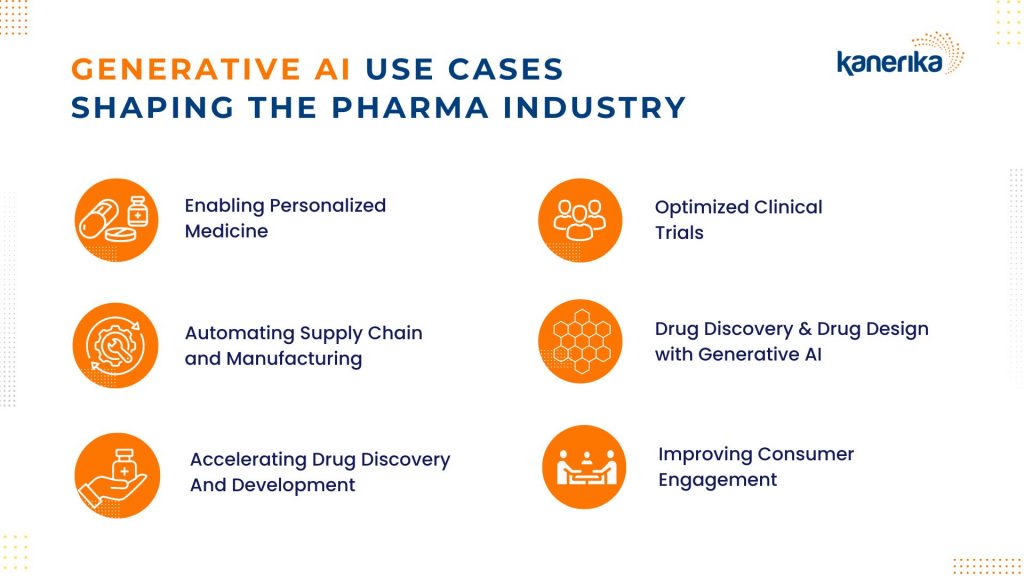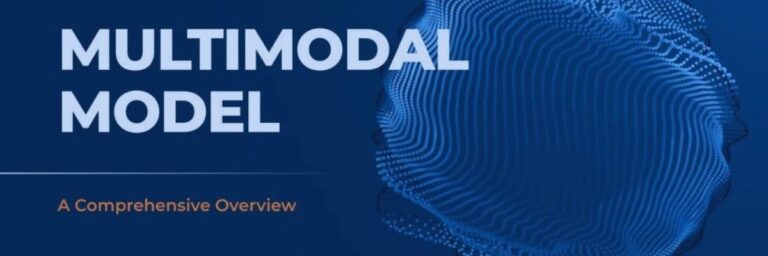When businesses think of generative AI, most think of automated chatbots or code-writing bots to be the extent of the technology. Few know that one of generative AI’s most exciting use cases is research! This makes it a goldmine of technology for pharmaceutical companies to avail.
GenAI is an invaluable tool for researchers and scientists as it can go through large datasets and identify patterns and trends that take human analysts far longer to detect.
This exponentially speeds up pharma research and drug development, which in turn, leads to faster production of new life-saving drugs.
This sentiment is echoed by Rajesh Kari, a senior leader in the pharma industry, who quoted the following in a recent article by Forbes: “Even in this exploratory stage, generative AI has shown tremendous potential to revolutionize research…
This shift towards AI is backed by significant data: 95% of pharmaceutical companies are investing in AI, anticipating it to generate an annual value of up to $410 billion by 2025.
The impact on clinical trials is particularly striking, with potential cost reductions of 70% and time savings of 80%. Moreover, AI could shorten drug development timelines by four years and save $26 billion.
In this blog, we will explore the top seven use cases for generative AI in pharmaceutical sector, highlighting its transformative impact and the incredible future it promises.
What is Generative AI?
Generative AI, a transformative force in modern technology, refers to artificial intelligence’s ability to create new content, including text, images, music, audio, and videos. Powered by foundation models, these large AI models are adept at multitasking and capable of tasks like summarization, question answering, and classification with minimal training.
At its core, generative AI operates through machine learning models that learn from human-created content, identifying patterns and relationships to generate similar outputs.
Across various industries, generative AI has made significant strides. Particularly in enhancing customer interactions, analyzing unstructured data, and automating repetitive tasks like responding to proposals and localizing content.
But, how does it impact the pharmaceutical industry? Let’s take a deep dive.

Generative AI’s Growth in Pharmaceutical Industry
The pharmaceutical industry is increasingly embracing Generative AI (GenAI) amidst rising healthcare costs and operational complexities. PwC’s projection of a 7% increase in healthcare costs by 2024, attributed to factors like workforce shortages and inflation, has spurred the industry to seek innovative solutions.
Generative AI emerges as a key technology in this context. Offering a way to maintain efficient patient care without escalating operational expenses.
Accenture’s research indicates that AI could enhance 40% of healthcare providers’ working hours, and Forbes suggests that it could save the US medical sector around $200 billion annually.
In the pharmaceutical sector, GenAI leverages machine learning algorithms to analyze and learn from unstructured data, such as patient records and medical images, to generate new, similar content.
The Boston Consulting Group (BCG) highlights GenAI’s transformative role in biopharma, particularly in reducing drug R&D timelines. Its potential spans the entire value chain, from development to commercialization.
However, the implementation of GenAI in this complex, regulation-intensive industry presents significant challenges. It demands a strategic blend of technology and strategy, tailored to the unique needs of each organization.
What are the Challenges with Generative AI in Pharmaceutical Industry?

While Generative AI holds immense potential for innovation in the pharmaceutical industry, it also brings forth a spectrum of challenges that need addressing.
According to Software Advice’s 2026 survey of 400 U.S. healthcare providers, adoption barriers remain stubbornly real. 24% struggle with integrating AI into existing systems, 32% cite poor data quality as a core challenge, and 19% point to employee skepticism as a significant roadblock. Despite these hurdles, 88% of practices that have adopted AI and are measuring outcomes report positive ROI, suggesting the payoff is there for those who push through.
These challenges range from regulatory compliance and data quality issues to ethical considerations and integration complexities.
Let’s explore some of the key challenges that pharmaceutical companies face with Generative AI.
Read More – Generative AI in Telecom: Use Cases and Benefits
Changing Regulatory Compliance
The swift evolution of Generative AI in pharmaceuticals presents a significant challenge in regulatory compliance. Outpacing existing frameworks necessitates adaptable, agile regulations that ensure patient safety and ethical practices.
Regulatory bodies must collaborate with industry experts to develop guidelines covering data privacy, algorithmic transparency, and validation processes.

Poor Quality of Input Data
The burgeoning role of real-world data (RWD) in the pharmaceutical industry, offers vast opportunities for real-world evidence (RWE) crucial for patient care and innovation.
However, the effectiveness of Generative AI, such as Large Language Models (LLMs), hinges on the quality of input data.
Inaccurate or poor-quality data can significantly impair these models, leading to unreliable outputs. McKinsey’s insights underscore the necessity of high-quality data to ensure these AI models generate dependable insights, a critical factor in an industry where decisions directly impact patient health and treatment outcomes.
Ethical Considerations
In the pharmaceutical industry, ethical considerations in Generative AI usage are crucial. Prioritizing transparency, fairness, and accountability in AI algorithms is essential to prevent biases and errors.
Rigorous testing and continuous monitoring are vital to maintain integrity and ethical standards. Thus, fostering trust and acceptance of AI technologies in healthcare.
Businesses should also have a fair AI use policy that dictates the rights and wrongs of using the technology in their industry.
Difficulty Maintaining Intellectual Property Rights
In the healthcare sector, the rise of Generative AI necessitates stringent adherence to intellectual property rights, focusing on patient privacy and data security.
Compliance with regulations like GDPR and HIPAA is crucial, requiring robust security measures like encryption, access controls, and secure storage.
Integration with Existing Systems
The successful integration of Generative AI in pharmaceutical industry demands collaboration across disciplines.
Data scientists, researchers, healthcare providers, and regulatory bodies must work together to ensure seamless compatibility with existing systems.
This interdisciplinary approach is key to overcoming technical and workflow challenges and unlocking enhanced efficiency and accuracy in drug development and patient care.

Top 7 Generative AI Use Cases In Pharmaceutical Industry
While adopting generative AI may have its challenges, working with an experienced AI consulting company can solve most of the roadblocks. This presents pharma companies with a unique opportunity to benefit from generative AI’s powerful features. Here are the top seven use cases concerning Generative AI in pharmaceutical industry.:

Use Case 1 – Enabling Personalized Medicine
Generative AI (GenAI) is revolutionizing the pharmaceutical industry by facilitating personalized medicine, a paradigm shift from the traditional one-size-fits-all approach. By analyzing extensive patient data, including genetic profiles, medical histories, and lifestyle factors, GenAI algorithms can tailor treatment plans to individual needs.
A notable example is the orthopedic AI lab at Mayo Clinic, led by Dr. Cody C. Wyles. This lab exemplifies GenAI’s application in creating personalized treatment strategies. They have developed AI tools that analyze radiological data, such as X-rays, to provide insights tailored to individual patient care. This approach not only enhances diagnostic accuracy but also paves the way for more personalized and effective treatment plans.
Use Case 2 – Automating Supply Chain and Manufacturing with Generative AI
Generative AI is transforming the pharmaceutical industry’s supply chain and manufacturing processes. It optimizes these crucial areas by accurately forecasting drug demands based on market trends, historical sales data, and external factors.
This advanced analysis ensures adequate medication supply while minimizing wastage. Additionally, Generative AI identifies opportunities to streamline manufacturing, leading to cost reductions and improved efficiency.

Use Case 3 – Accelerating Drug Discovery And Development with Generative AI
Generative AI is making significant strides in the pharmaceutical industry, particularly in drug discovery and development.
This technology accelerates the process by analyzing molecular properties, projecting compound models, predicting outcomes of combinations, and forecasting potential adverse effects of new drugs.
Not only does it shorten the time to market, but it also substantially reduces the traditionally high costs associated with drug development.
A notable example noted by Forbes is Insilico Medicine’s Pharma.AI platform, which has successfully produced a range of AI-designed drugs for various diseases, including cancer. One of its prominent achievements is the development of a USP1 inhibitor for treating solid tumors. The USP1 inhibitor has received FDA approval for clinical trials.
Another innovative application is seen with Adaptyv Bio, a Switzerland-based biotech startup. In March 2023, they announced a platform utilizing Generative AI for protein engineering.

Use Case 4 – Optimized Clinical Trials with Generative AI
Generative AI is revolutionizing clinical trials, a crucial yet often inefficient stage in drug development. By enhancing trial design and patient selection, Generative AI streamlines this process, leading to more effective and efficient outcomes.
Clinical trials traditionally face challenges like delays and selection inefficiencies. Generative AI combats these by analyzing extensive patient data to identify patterns influencing trial success.
This enables precise patient subgroup identification, optimizing trials for those most likely to respond to specific treatments. For example, AI algorithms can pinpoint genetic markers predicting a patient’s drug response, ensuring a more personalized treatment approach.
Use Case 5 – Drug Discovery with Generative AI
Generative AI is revolutionizing the traditionally lengthy and costly process of drug discovery and design.
Typically, bringing a drug to market can take 12 to 18 years with costs averaging $2.6 billion, and only about 10% of candidates advance to clinical trials. Generative AI offers a transformative solution to these challenges.
For example, AI algorithms can be trained to create molecules that precisely bind to certain proteins, significantly reducing the time and cost of identifying viable drug candidates.
Similarly, companies like Insilico Medicine, Exscientia, Iktos, and Adaptyv Bio are also harnessing generative AI for drug discovery.

Use Case 6 – Drug Design with Generative AI
Generative AI is transforming drug design, a crucial step after identifying potential drug candidates. As reported by the Boston Consulting Group, biotech companies with an AI-first approach have progressed significantly, with over 150 small-molecule drugs in discovery and more than 15 in clinical trials.
This technology streamlines the design of drugs to effectively target specific proteins by generating molecular structures optimized for potency, selectivity, and bioavailability.
A standout innovation in this field is AbSci’s approach to designing antibodies from scratch. Unlike conventional methods that depend on existing antibody libraries, AbSci uses a zero-shot AI approach to design novel antibodies without prior learning on specific targets.
This method not only expedites the development of new drug leads but also opens avenues for treating diseases previously considered “undruggable.”
Another example is Adaptyv Bio, a Swiss biotech startup that has developed a platform using generative AI for protein engineering.
This was made by combining advanced algorithms, robotics, and synthetic biology to optimize protein sequences. Thereby, enhancing the efficiency and precision of drug design.

Use Case 7 – Improving Consumer Engagement with Generative AI
Generative AI is transforming pharmaceutical consumer engagement. AI-powered chatbots, trained with extensive customer data, provide 24/7 support, personalized interactions, and vital drug information.
This technology enhances patient engagement by offering tailored content and recommendations, fostering medication adherence, and strengthening patient-physician relationships.
Kanerika – The Generative AI Implementation Firm for Pharmaceutical Companies
As a pharmaceutical company, following regulations and compliance is essential for undertaking technological transformations such as generative AI.
However, implementation of generative AI can be difficult for companies that have no prior experience working with AI/ML processes.
An appropriate generative AI implementation for a company involves selecting the right algorithms. Ensuring compliance with protocols, reducing biases by carefully selecting training data, and ethically using generative AI. Therefore, businesses must choose the right AI consulting partner to partner with.
Kanerika has been an industry leader in AI/ML and data management for over two decades. As well as, has experience in providing complete end-to-end solutions for businesses.
Kanerika’s team of 100+ highly skilled professionals is well-versed in the latest technologies related to Generative AI and AI/ML. The team has also carried out many successful integrations with AI-driven solutions across industries, enabling businesses to leverage the full potential of gen AI through various use cases.
Book a meeting with Kanerika today and future-proof your business operations with generative AI!

FAQs
How is generative AI used in pharma?
Generative AI in pharma accelerates drug discovery by designing novel molecules with desired properties, significantly speeding up the traditionally lengthy process. It also aids in analyzing complex biological data to identify potential drug targets and personalize treatments based on individual patient profiles. Essentially, it acts as a powerful predictive tool, boosting efficiency and innovation across the drug development pipeline. This leads to faster time-to-market and potentially more effective medications.
How is AI used in the pharmaceutical industry?
AI dramatically accelerates drug discovery by analyzing vast datasets to identify promising drug candidates and predict their effectiveness, slashing development time and costs. It also personalizes medicine through predictive analytics, tailoring treatments based on individual patient profiles and genetic information. Furthermore, AI streamlines clinical trials by optimizing patient recruitment and analyzing trial data more efficiently. Ultimately, AI boosts both the speed and precision of pharmaceutical innovation.
How to successfully scale generative AI in pharma?
Scaling generative AI in pharma requires a phased approach. Start with clearly defined, high-value use cases (e.g., drug discovery) and build robust data pipelines. Prioritize explainability and validation to ensure regulatory compliance and trust. Finally, cultivate interdisciplinary teams with expertise in both AI and pharmaceutical science.
How can generative AI be used in healthcare?
Generative AI offers healthcare a powerful boost by creating realistic simulations for training, accelerating drug discovery through molecule design, and personalizing treatments based on individual patient data. It can also analyze medical images with impressive accuracy, aiding diagnosis. Essentially, it helps automate tasks, enhance precision, and improve the efficiency of care delivery.
How are big pharma companies using AI?
Big Pharma uses AI to drastically speed up drug discovery, analyzing massive datasets to identify promising drug candidates far quicker than traditional methods. AI also enhances clinical trials by better predicting patient responses and optimizing trial design for efficiency. Essentially, AI is accelerating every stage of the drug development pipeline, from identifying targets to getting medications to market faster. This leads to potential cost savings and faster access to life-saving treatments.
What is the most famous generative AI?
The title of “most famous” generative AI is debatable and shifts, but currently, models like DALL-E 2 and Stable Diffusion are strong contenders due to their widespread public access and impressive image generation capabilities. Their fame stems from accessibility and viral examples of their creative outputs. Ultimately, “most famous” depends on the criteria used—user base, media attention, or impact on a specific field.
What are generative AI models for drug discovery?
Generative AI in drug discovery uses algorithms to design novel molecules with desired properties, bypassing traditional trial-and-error methods. These models predict a molecule’s effectiveness and safety, significantly accelerating and optimizing the drug development process. Essentially, they act as highly intelligent, automated chemists, exploring a vastly larger chemical space than humans could ever manage. This leads to faster identification of promising drug candidates.
What are generative AI tools?
Generative AI tools are like supercharged digital artists and writers. They create new content – text, images, music, even code – based on patterns learned from massive datasets. Unlike traditional AI that analyzes or classifies, these tools *generate* something entirely novel. Think of them as sophisticated prediction engines for creativity.
How AI can be used in pharmacy?
AI streamlines pharmacy operations by automating tasks like prescription filling and inventory management, freeing up pharmacists for patient care. It also enhances medication safety through sophisticated error detection and personalized medication recommendations. Furthermore, AI aids in drug discovery and development, accelerating the creation of new therapies. Ultimately, AI boosts efficiency and patient outcomes within the pharmacy setting.
What drug company is using AI?
Many pharmaceutical companies are leveraging AI, not just one. They’re using it across the drug development lifecycle, from identifying promising drug candidates to personalizing treatments. This is a rapidly evolving field, with constant innovation in AI applications within the industry. Think of it as a widespread adoption rather than a single company’s focus.
How is AI changing pharma?
AI is revolutionizing pharma by accelerating drug discovery, drastically reducing the time and cost of bringing new medicines to market. It’s achieving this through advanced analytics that predict drug efficacy and safety, personalize treatments based on individual patient profiles, and optimize clinical trial design. Essentially, AI is making the entire pharmaceutical process smarter, faster, and more efficient.
What is generative AI vs AI?
Generative AI is a *subset* of AI that focuses on *creating* new content, like text, images, or code, rather than just analyzing existing data. Standard AI analyzes data to make predictions or decisions; think spam filters versus an AI that writes a poem. Generative AI builds; regular AI understands.
What is the role of artificial intelligence in the pharmaceutical industry?
AI dramatically accelerates drug discovery by analyzing vast datasets to identify promising drug candidates and predict their effectiveness, slashing development time and costs. It also personalizes medicine through predictive analytics, tailoring treatments to individual patients based on their genetic makeup and lifestyle. Furthermore, AI optimizes manufacturing processes, improving efficiency and reducing waste. In short, AI is revolutionizing every stage of the pharmaceutical pipeline.









